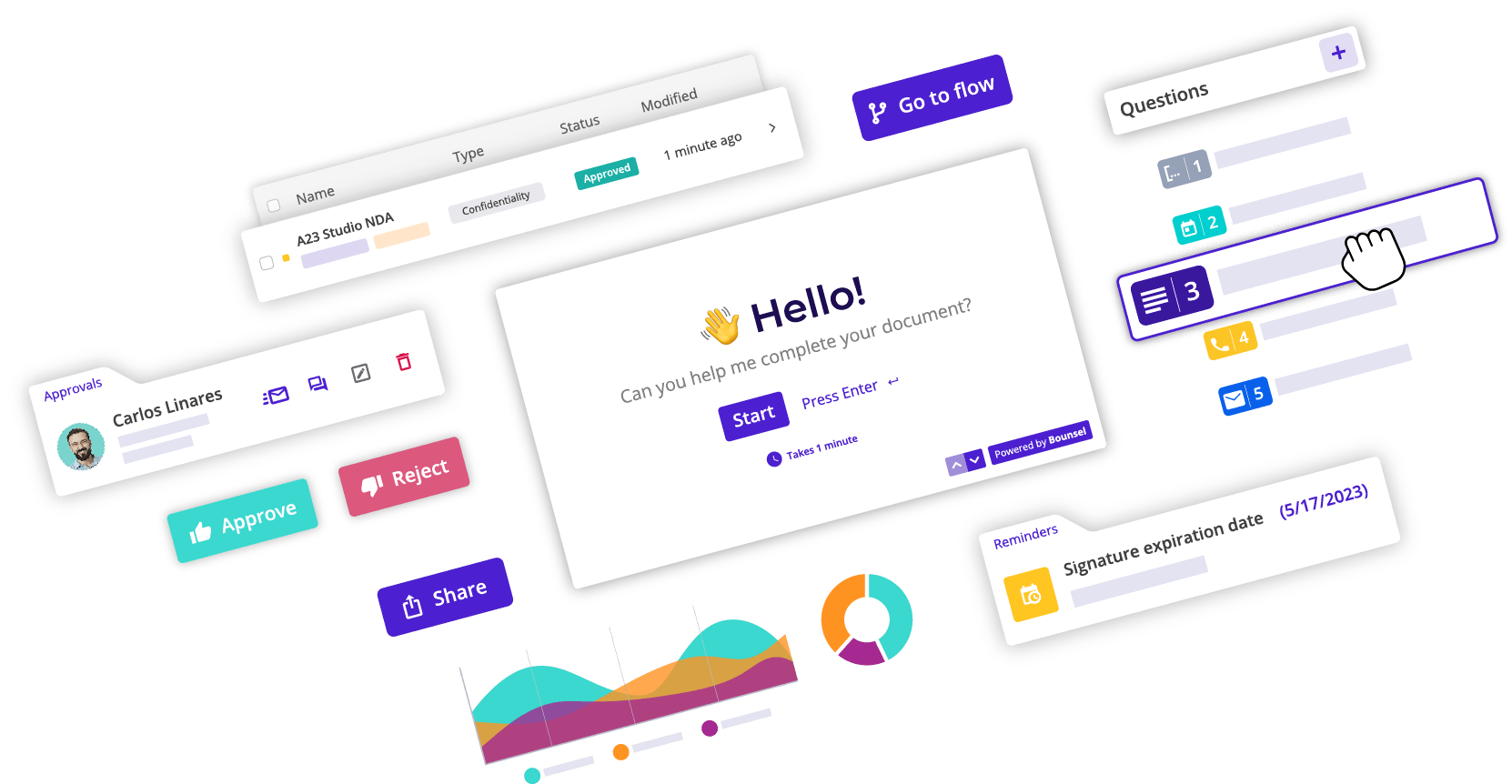Boost your productivity and support your company in a more efficient way.
The in-house lawyer is one of the most consulted professionals in a company, having to complete a multitude of tasks that often have a mechanical nature. For this reason, we present four automatable contracts to make the drafting and execution of your documents much simpler and easier:
1. NDA (Non-Disclosure Agreement)
An NDA or confidentiality agreement is a contract that is intended to legally bind the parties not to disclose information that they exchange with each other for a specific objective or purpose and that is not or should not reach the public domain.
Therefore, the vast majority of a company’s interactions with third parties will require such a contract. In this way the know-how and other objects that are linked to Intellectual and Industrial Property are protected, being able to automate the document depending on a series of parameters.
Within an NDA there are clauses that are repeated, such as the subject matter of the agreement, the duty of confidentiality, or the data protection clause. But there are also other clauses that are modified according to: the duration of the contract (fixed term or indefinite term), the causes of non-performance or any agreed exception.
For all these clauses, automation is possible, since different scenarios can be foreseen in this legal document so that, when it is completed, the clauses that have already been modified or are more in line with the contractual relationship established between the parties will appear.
-min.jpg)
2. Distribution contract
Companies, especially when they have well-known brands, usually establish different distribution contracts in which a distributor markets the company’s products or services, acting on its own account and, therefore, assuming the risks of the agreed transaction.
There are a multitude of distribution contracts: concession contract, franchise contract, supply contract, etc. Each with its own particularities, but with many options for automation.
Thanks to the contract automation tools, a large number of sample contracts can be sent and easily completed by distributors.
For example, in a franchise contract, if the company presents several trademarks, a contract may be generated in which, depending on the distinctive sign that the distributor intends to exploit, specific clauses will be automatically created. Therefore, it will only be necessary to send a franchise contract that may include any of the brands to be exploited by the distributor.
3. Deposit contract
The deposit contract is defined as a contract whereby a person who receives a movable thing is obliged to take custody of it and to return it when it is claimed.
For it to be a commercial contract, the depositary must be professionally engaged in such activity, the thing deposited must be an object of commerce and the deposit must be a commercial transaction or must be made for a cause or as a consequence of a commercial transaction.
This contract will establish the different obligations of the depositary and depositor. In addition, it may be subject to some specific clauses due to a series of particularities, as in the case of an irregular deposit, administrative deposit or open and closed cash deposits.
But as we have already mentioned, these particularities can be reflected in the document to be automated so that, depending on the input of the parties, one type of deposit contract or another is auto-generated, with all the parties’ data completed.
-min.jpg)
4. Contract of carriage of goods
The contract of carriage of goods is established for a carrier to move, in exchange for a price, goods from one place to another to make them available to the person designated in the contract.
This type of contract involves 3 parties: the shipper who delivers the goods, the carrier who performs the transport, and the consignee who will receive the goods.
There is usually a certain complexity in these contracts, but this does not prevent them from being automated. By setting up an automated document that can accommodate all the different possibilities it presents, such as the actual elements (the goods or the methods of payment) and the content of the contract itself (rights and obligations), any carrier and consignee will be able to complete the document provided by the shipper of the goods in a matter of minutes.
Therefore, they will only need to complete a series of variable sections that will later generate the contract. And, as in the previous cases, the different sections can also be negotiated in order to reach a good agreement.
How to automate a contract?
First, you need a cloud-based documentation management platform, such as Bounsel.
With this tool, you will be able to create templates for each type of contract, where you will include the clauses and sections that remain fixed. Therefore, the steps to follow are:
1. Add fixed clauses and sections to your document.
2. Create smart fields or variable fields in the parts of the contract that can change, such as the name of the parties involved, for example.
3. To complete your documents even faster, convert smart fields into questions to create an interactive form.
4. Save your document as a template and access it whenever you need it. You can fill in the variable fields or simply answer the questions on the form and your contract will be completed in a matter of seconds.
This way, you can provide a more convenient, faster and more intuitive service.
Do you want to add value to your services? Leave aside the more mechanical processes of legal documentation and focus on what really matters. Discover Bounsel!










